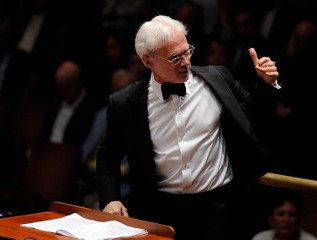|
Back
Precision from the Fiddler's Bow Houston
Jones Hall
01/31/2014 - & February 1, 2, 2014
Aaron Copland: El Salón México
Erich Wolfgang Korngold: Violin Concerto in D Major, Opus 35
John Adams: City Noir
Gil Shaham (violin)
Houston Symphony Orchestra, John Adams (conductor) 
J. Adams (© Lambert Orkis)
The composer-as-conductor has a long and mixed history in the twentieth century. Britten and Bernstein were without peer in conducting their own works and left important recordings of other composers’ music. That trend continues today with the likes of Pierre Boulez, Thomas Adès and Matthias Pintscher. By contrast, Igor Stravinsky and Aaron Copland, while offering valuable interpretive insights into their own works, were not always their own greatest interpreters. John Adams is without a doubt one of the most important living American composers today, and he has been conducting his own and others’ works with some of the world’s major ensembles for many years. The exciting program for his debut with the Houston Symphony revealed a timid conductor, however, with shaky direction of the two non-Adams works on the program.
The evening began Copland’s El Salón México, the timid, hesitant performance of which stemmed primarily from Adams’ conducting. With head buried in the score, there was little to no communication with the orchestra, no indication from the podium of musical arrivals that are structurally important, and a heavy beat pattern that weighed down the work’s fast music. It was, unfortunately, not a great start to the concert, despite the fine playing of the orchestra, which did its best to keep the piece rhythmically sturdy.

G. Shaham (© Christian Steiner)
Fortunately, this was followed by a thrilling, definitive performance of Korngold’s opulent Violin Concerto by Gil Shaham. Playing the dizzyingly virtuosic score without effort, the tip of Shaham’s bow was a more important baton than the one in Adams’ hand. The violinist exuded sheer pleasure in the wonderful music he was making, shuffling, smiling and endlessly communicating with the musicians of the orchestra, who responded with the richest foundation for Shaham to fiddle above. Both soloist and orchestra dug into the finale’s challenging, twisting gigue figures, while the tender, central Romanze brought delicately limned melodic phrasing and wonderfully blended, transparent harmonies. The concerto’s patina of nostalgia for fin de siècle Vienna is apparent from the very opening gesture, and Shaham’s engaging, charismatic rendition received an appropriately rapturous response.
Mr. Adams seemed only slightly more comfortable when he took the podium to conduct his own music. After briefly speaking about his inspiration for the work, he unleashed the signature sheets of rhythm that pervade City Noir. Adams is a masterful composer for the orchestra, with an uncanny knack for piling on more and more layers while keeping textures transparent. That said, this and many other recent pieces often come across as rote Fortspinnung, lacking the clear harmonic teleology that make many of his earliest successes—Harmonielehre chief among them—so convincing. The large structure of City Noir is bewildering, the break after the first two connected sections an unwelcome, inorganic interruption of the music’s flow.
The orchestra stepped up to the vertiginous demands of the score, with especially fine horn and trombone solos. Added to the mix was Timothy McAllister’s expert saxophone playing, and these and other individuals dove in and out of the sonic tempests being swirled around them by the rest of the orchestra. The visceral nature of the work’s virtuosity was its most memorable aspect.
The premiere performance of City Noir, from Los Angeles with Gustavo Dudamel, features clear and cogent communication between podium and orchestra, and is readily available on YouTube, while Leonard Bernstein’s machismo, thrilling accounts of El Salón México abound on CD. One must applaud Adams’ courage to submit to being compared to these conductors, from whom he could learn so much.
Marcus Karl Maroney
|